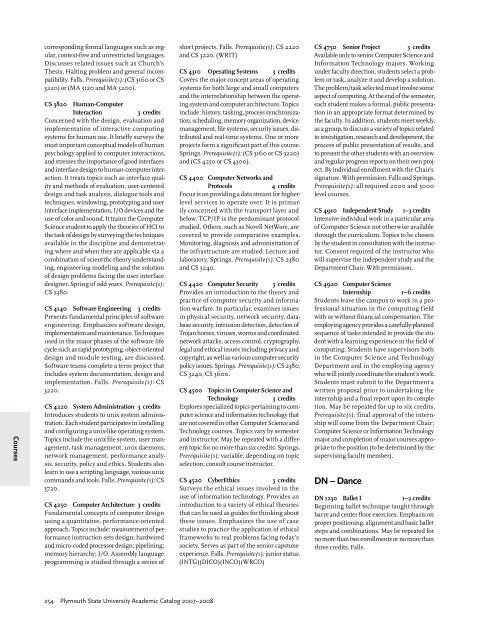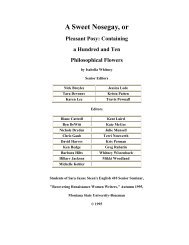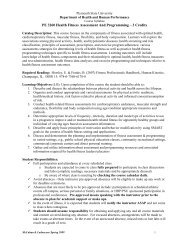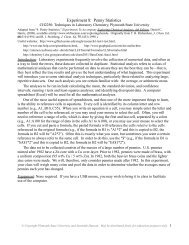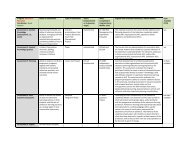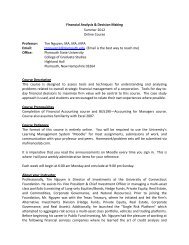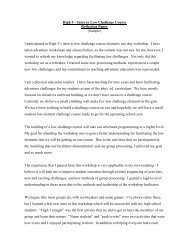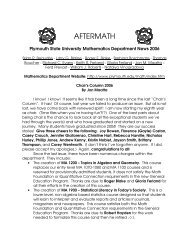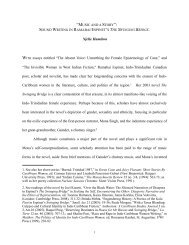2007-2008 Undergraduate Academic Catalog - Plymouth State ...
2007-2008 Undergraduate Academic Catalog - Plymouth State ...
2007-2008 Undergraduate Academic Catalog - Plymouth State ...
- No tags were found...
Create successful ePaper yourself
Turn your PDF publications into a flip-book with our unique Google optimized e-Paper software.
Coursescorresponding formal languages such as regular,context-free and unrestricted languages.Discusses related issues such as Church’sThesis, Halting problem and general incompatibility.Falls. Prerequisite(s): (CS 3160 or CS3220) or (MA 3120 and MA 3200).CS 3820 Human-ComputerInteraction3 creditsConcerned with the design, evaluation andimplementation of interactive computingsystems for human use. It briefly surveys themost important conceptual models of humanpsychology applied to computer interactions,and stresses the importance of good interfacesand interface design to human-computer interaction.It treats topics such as interface qualityand methods of evaluation, user-centereddesign and task analysis, dialogue tools andtechniques, windowing, prototyping and userinterface implementation, I/O devices and theuse of color and sound. It trains the ComputerScience student to apply the theories of HCI tothe task of design by surveying the techniquesavailable in the discipline and demonstratingwhere and when they are applicable via acombination of scientific-theory understanding,engineering modeling and the solutionof design problems facing the user interfacedesigner. Spring of odd years. Prerequisite(s):CS 2380.CS 4140 Software Engineering 3 creditsPresents fundamental principles of softwareengineering. Emphasizes software design,implementation and maintenance. Techniquesused in the major phases of the software lifecycle such as rapid prototyping, object-orienteddesign and module testing, are discussed.Software teams complete a term project thatincludes system documentation, design andimplementation. Falls. Prerequisite(s): CS3220.CS 4220 System Administration 3 creditsIntroduces students to unix system administration.Each student participates in installingand configuring a unix-like operating system.Topics include the unix file system, user management,task management, unix daemons,network management, performance analysis,security, policy and ethics. Students alsolearn to use a scripting language, various unixcommands and tools. Falls. Prerequisite(s): CS3720.CS 4250 Computer Architecture 3 creditsFundamental concepts of computer designusing a quantitative, performance-orientedapproach. Topics include: measurement of performanceinstruction sets design; hardwiredand micro-coded processor design; pipelining;memory hierarchy; I/O. Assembly languageprogramming is studied through a series ofshort projects. Falls. Prerequisite(s): CS 2220and CS 3220. (WRIT)CS 4310 Operating Systems 3 creditsCovers the major concept areas of operatingsystems for both large and small computersand the interrelationship between the operatingsystem and computer architecture. Topicsinclude: history, tasking, process synchronization,scheduling, memory organization, devicemanagement, file systems, security issues, distributedand real-time systems. One or moreprojects form a significant part of this course.Springs. Prerequisite(s): (CS 3160 or CS 3220)and (CS 4250 or CS 4300).CS 4400 Computer Networks andProtocols4 creditsFocus is on providing a data stream for higherlevelservices to operate over. It is primarilyconcerned with the transport layer andbelow. TCP/IP is the predominant protocolstudied. Others, such as Novell NetWare, arecovered to provide comparative examples.Monitoring, diagnosis and administration ofthe infrastructure are studied. Lecture andlaboratory. Springs. Prerequisite(s): CS 2380and CS 3240.CS 4420 Computer Security 3 creditsProvides an introduction to the theory andpractice of computer security and informationwarfare. In particular, examines issuesin physical security, network security, databasesecurity, intrusion detection, detection ofTrojan horses, viruses, worms and coordinatednetwork attacks, access control, cryptography,legal and ethical issues including privacy andcopyright, as well as various computer securitypolicy issues. Springs. Prerequisite(s): CS 2380,CS 3240, CS 3600.CS 4500 Topics in Computer Science andTechnology3 creditsExplores specialized topics pertaining to computerscience and information technology thatare not covered in other Computer Science andTechnology courses. Topics vary by semesterand instructor. May be repeated with a differenttopic for no more than six credits. Springs.Prerequisite(s): variable, depending on topicselection; consult course instructor.CS 4520 CyberEthics3 creditsSurveys the ethical issues involved in theuse of information technology. Provides anintroduction to a variety of ethical theoriesthat can be used as guides for thinking aboutthese issues. Emphasizes the use of casestudies to practice the application of ethicalframeworks to real problems facing today’ssociety. Serves as part of the senior capstoneexperience. Falls. Prerequisite(s): junior status.(INTG)(DICO)(INCO)(WRCO)CS 4750 Senior Project 3 creditsAvailable only to senior Computer Science andInformation Technology majors. Workingunder faculty direction, students select a problemor task, analyze it and develop a solution.The problem/task selected must involve someaspect of computing. At the end of the semester,each student makes a formal, public presentationin an appropriate format determined bythe faculty. In addition, students meet weekly,as a group, to discuss a variety of topics relatedto investigation, research and development, theprocess of public presentation of results, andto present the other students with an overviewand regular progress reports on their own project.By individual enrollment with the Chair’ssignature. With permission. Falls and Springs.Prerequisite(s): all required 2000 and 3000level courses.CS 4910 Independent Study 1–3 creditsIntensive individual work in a particular areaof Computer Science not otherwise availablethrough the curriculum. Topics to be chosenby the student in consultation with the instructor.Consent required of the instructor whowill supervise the independent study and theDepartment Chair. With permission.CS 4920 Computer ScienceInternship 1–6 creditsStudents leave the campus to work in a professionalsituation in the computing fieldwith or without financial compensation. Theemploying agency provides a carefully-plannedsequence of tasks intended to provide the studentwith a learning experience in the field ofcomputing. Students have supervisors bothin the Computer Science and TechnologyDepartment and in the employing agencywho will jointly coordinate the student’s work.Students must submit to the Department awritten proposal prior to undertaking theinternship and a final report upon its completion.May be repeated for up to six credits.Prerequisite(s): final approval of the internshipwill come from the Department Chair;Computer Science or Information Technologymajor and completion of major courses appropriateto the position (to be determined by thesupervising faculty member).DN – DanceDN 1230 Ballet I1–2 creditsBeginning ballet technique taught throughbarre and center floor exercises. Emphasis onproper positioning, alignment and basic balletsteps and combinations. May be repeated forno more than two enrollments or no more thanthree credits. Falls.254 <strong>Plymouth</strong> <strong>State</strong> University <strong>Academic</strong> <strong>Catalog</strong> <strong>2007</strong>–<strong>2008</strong>


